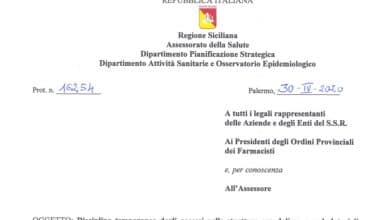
Hundreds more deaths: this seems to be the result of the drop in vaccinations against the flu that occurred in the elderly last winter due to the "Fluad case", i.e. the withdrawal of the Novartis flu vaccine by AIFA.
 He stated it Walter Ricciardi, extraordinary commissioner of the Higher Institute of Health, on the sidelines of a conference on the subject of vaccines organized yesterday in Rome. The vaccine was then cleared of any suspicion, but the consequences were dramatic. "Like ISS, we are carrying out a study to evaluate the effects of the drop in vaccinations that there has been, evaluable around at least 25-30% - said Ricciardi - but the preliminary results tell us that there has been an excess of mortality, in addition to the eight thousand deaths that are the norm every year there have been a few hundred more".
He stated it Walter Ricciardi, extraordinary commissioner of the Higher Institute of Health, on the sidelines of a conference on the subject of vaccines organized yesterday in Rome. The vaccine was then cleared of any suspicion, but the consequences were dramatic. "Like ISS, we are carrying out a study to evaluate the effects of the drop in vaccinations that there has been, evaluable around at least 25-30% - said Ricciardi - but the preliminary results tell us that there has been an excess of mortality, in addition to the eight thousand deaths that are the norm every year there have been a few hundred more".
It is not amazed Charles Signorelli, president of the Italian Society of Hygiene, Preventive Medicine and Public Health (Siti), also present at the  Roman conference: «We immediately realized that the Fluad episode, which took place at the end of last November, would have heavily reduced adherence to the flu vaccination this season. And it is natural that, in the presence of a significant drop in vaccination coverage, there have been health effects, even if clearly these do not depend only on the degree of coverage, but on other concomitant factors such as the aggressiveness of the virus and the dynamics of transmission ".
Roman conference: «We immediately realized that the Fluad episode, which took place at the end of last November, would have heavily reduced adherence to the flu vaccination this season. And it is natural that, in the presence of a significant drop in vaccination coverage, there have been health effects, even if clearly these do not depend only on the degree of coverage, but on other concomitant factors such as the aggressiveness of the virus and the dynamics of transmission ".
It will be important to make good use of this data, which confirms the usefulness of the vaccine, in fact, as Signorelli said, "next year it will be very challenging to propose the flu campaign and resume those percentages that the World Health Organization indicates as optimal for effective coverage".
Ricciardi recalled that one of the effects of the drop in vaccinations was the overcrowding that characterized some emergency rooms in the winter months, while "flu vaccines are extremely safe and there are no doubts about their effectiveness either".
Renato Torlaschi – Wednesday, April 15, 2015 – Doctor33
Related news: AIFA. CDC: Flu vaccination saved 40,000 lives in 9 years
AIFA publishes the 4th Report on the post-marketing surveillance of vaccines in Italy
Missing flu vaccinations 'help' in 8,000 deaths from complications
Elderly poorly informed about vaccines, risks of underestimated infections
Inaccurate knowledge of vaccinations as a means of prevention of many diseases
 Elderly people who are poorly informed about vaccines and unaware of the risks associated with infections. According to a survey by Censis, the elderly population has a rather imprecise knowledge of vaccinations as a tool for the prevention of many diseases, of which advanced age is a risk factor.
Elderly people who are poorly informed about vaccines and unaware of the risks associated with infections. According to a survey by Censis, the elderly population has a rather imprecise knowledge of vaccinations as a tool for the prevention of many diseases, of which advanced age is a risk factor.
From the latest data available for the 2013-2014 flu season, it appears that only 55.4% of the population over 65 years of age has been vaccinated, achieving a coverage rate well below the public health objectives indicated by the World Health Organization and the European Council, which are 75% as the minimum threshold and 95% as the optimal threshold. And this year, the first data even indicate a 20-30% reduction in flu vaccinations. These are the numbers illustrated in Rome at the conference on aging and prevention promoted by Italia Longeva.
The elderly, according to the survey, are also little interested in other equally important vaccinations, such as the one against pneumococcal pneumonia (only one in 3 is). The choice to get vaccinated is rather made from time to time and various factors weigh on the decision, including the perception of the risk and the level of information. "The main problem is precisely the perception of risk," said Ketty Vaccaro, head of the Welfare and Health sector of Censis.
"If age is almost a subjective factor and the information is often insufficient, if not confused and contradictory, the advice of the attending physician (for the 45.1% of the sample) and familiarity with this form of prevention acquired through vaccination against the flu are the factors capable of influencing the interest and development of vaccination among the elderly".
 "Vaccination remains the most effective tool for the prevention of infectious diseases - said Walter Ricciardi, professor of hygiene at the Catholic University of the Sacred Heart in Rome - It is therefore important to fight ideological resistance and provide correct information to citizens, emphasizing that vaccination represents a resource, not a threat, which helps to gain years in good health. Communication misunderstandings contribute to determining a drop in vaccinations, observable for example in the case of anti-flu vaccination, never as low as in recent years (- 20-30%)".
"Vaccination remains the most effective tool for the prevention of infectious diseases - said Walter Ricciardi, professor of hygiene at the Catholic University of the Sacred Heart in Rome - It is therefore important to fight ideological resistance and provide correct information to citizens, emphasizing that vaccination represents a resource, not a threat, which helps to gain years in good health. Communication misunderstandings contribute to determining a drop in vaccinations, observable for example in the case of anti-flu vaccination, never as low as in recent years (- 20-30%)".
“Despite the burden of infectious diseases on the elderly population – said Roberto Bernabei, president of Italia Longeva – vaccination for this target is not considered a routine health intervention and is highly underused. Suffice it to say that in the 2014 National Vaccine Prevention Plan, compared to an articulated offer for childhood and adolescence, there is a single vaccination, the flu vaccination, recommended for over 65s”.





